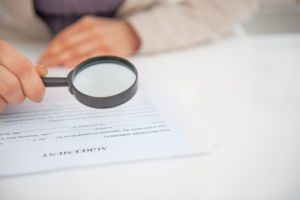 Discovery is a critical part of the litigation process. It involves the finding of facts, documents, and data based on an exchange of discovery requests. If all goes smoothly, both sides of the case learn the facts underlying the legal action. The process can be lengthy and expensive, but it allows each party to know the cards the other is holding. In most cases, after discovery, the parties can decide whether the facts warrant that they fold (settle for a fair amount) or call (go to trial because they think they have a strong case or the other party’s case is weak).
Discovery is a critical part of the litigation process. It involves the finding of facts, documents, and data based on an exchange of discovery requests. If all goes smoothly, both sides of the case learn the facts underlying the legal action. The process can be lengthy and expensive, but it allows each party to know the cards the other is holding. In most cases, after discovery, the parties can decide whether the facts warrant that they fold (settle for a fair amount) or call (go to trial because they think they have a strong case or the other party’s case is weak).
Discovery rules are part of the rules of civil procedure for state and federal courts. Discovery can take many forms, including the following:
- Interrogatories: The parties ask each other questions, in writing, to gather information.
- Requests for production: These requests ask for copies of documents, data, e-mail, videos, texts, and physical items, such as computer hard drives.
- Requests for admissions: A party writes factual statements, and the other party can admit or deny them.
- Depositions: Attorneys from both parties can question, under oath, people with firsthand knowledge of relevant facts.
Discovery Allows You to Know Who Holds Which Cards
For both parties, discovery is an opportunity to tell their side of the story. Discovery responses can put together a narra tive for the case.
tive for the case.
A party can ask for anything and everything it wants. However, there are limits to how much the other party is required to offer in response. If the other party believes the request is overly broad, harassing, burdensome, argumentative, or not meant to lead to the disclosure of evidence that could be relevant to the case, that party can object. Normally, a responding party may narrow or reword the interrogatory, request, or question. Sometimes a party will drop the request entirely. A party can also seek a ruling from a judge as to whether a response is required.
Through discovery, both parties should have a better handle on the case:
- They should know the relevant facts to the case and consider what the outcome will likely be after a judge or jury gets these facts.
- Through discovery, a party may not only learn facts about relevant subjects but also learn what other requests to make.
- A witness in a case may be critical to its outcome. However, if a witness being deposed is nervous, is argumentative, appears not to be truthful, or cannot handle the pressure of a deposition, the party planning to call that witness may want to think long and hard before going to trial and having to put that witness on the stand. Even if you have good facts to back up your case, what the jury may remember is the bad witness.
There Are Limits on What You Can Ask
Discovery is supposed to cast a fairly wide net. In fact, the net is typically so wide that you can gather evidence that you may not be able to use at trial. During discovery, you may learn something particularly damaging to the other side. Meanwhile, the opposing attorney may try to develop legal arguments to prevent you from using that evidence at trial.
Generally, plaintiffs make broad requests that try to gather a lot of information and potential evidence.
- They are looking for information that supports their claims, especially information they did not know before.
- They may find damaging e-mails or evidence of treatment of other employees that shows a pattern of illegal acts by the employer.
Generally, defendants seek to limit plaintiffs’ discovery requests.
- This restricts the flow of potentially damaging evidence and saves defendants time, money, and energy gathering and organizing responses to requests.
- Time that managers spend in depositions is time they are not spending running the business.
A Case Example
 A case from the U.S. Court of Appeals for the Seventh Circuit illustrates the limits to discovery requests. Susan Kuttner lost her job as a deputy sheriff for conduct unbecoming an officer and improper wearing of her uniform. (While on duty and in uniform, she tried to collect a debt that someone owed her boyfriend.) She claimed her termination constituted sex discrimination in that male employees committed infractions just as bad, if not worse, but suffered less severe discipline.
A case from the U.S. Court of Appeals for the Seventh Circuit illustrates the limits to discovery requests. Susan Kuttner lost her job as a deputy sheriff for conduct unbecoming an officer and improper wearing of her uniform. (While on duty and in uniform, she tried to collect a debt that someone owed her boyfriend.) She claimed her termination constituted sex discrimination in that male employees committed infractions just as bad, if not worse, but suffered less severe discipline.
Her attorney cast a net too wide with discovery requests—so much so that the defense accused him of being on a “fishing expedition.” (Lawyers and judges use this phrase when discovery requests ask for far more than what the discovery rules allow.) He asked for the personnel files of 30 employees, including the sheriff’s wife, without any limits as to time frame or infraction. The judge limited the scope of the request by restricting the time frame (to events starting in 2006, because Kuttner was fired in February 2010) and the types of infractions.
More than three months passed before the plaintiff’s attorney asked the judge to reconsider his decision. He did not, so the plaintiff appealed, and the appellate court agreed with the trial court. The appellate decision included the following quotes from the trial judge’s decision:
- “From the start of discovery, Plaintiff (actually, her counsel) has made overly broad and unduly burdensome discovery requests, some of which were unwarranted fishing expeditions bordering on harassment.”
- The trial judge viewed Kuttner’s attorney as “over-reaching.” Kuttner’s attorney also had “no solid factual basis” to believe he would uncover relevant evidence if the court lifted the discovery restrictions.
The appellate court found the judge’s time limit reasonable and ruled that it did not prevent Kuttner from having a meaningful opportunity for discovery. Limiting discovery is appropriate so the parties focus only on capturing information “reasonably calculated to lead to relevant evidence.” One thing that factors into relevance is time. Here, the judge decided that the focus should be on the treatment of employees working around the same time as the plaintiff.
Summing It Up
The discovery process may be critical to your case.
- You may learn facts or obtain evidence that builds up or cripples your case.
- After discovery, your attorney should have a much better idea as to the strength and value of your case.
- Then you and your attorney are in a better position to decide what would be a fair settlement value and whether you should try the case if settlement discussions fall short of your goal.
If you believe your employer has broken the law and you have suffered as a result, or if you have questions about the law and litigation process, contact our office. We will discuss your situation, the application of the law to your case, and ways to protect your rights.





